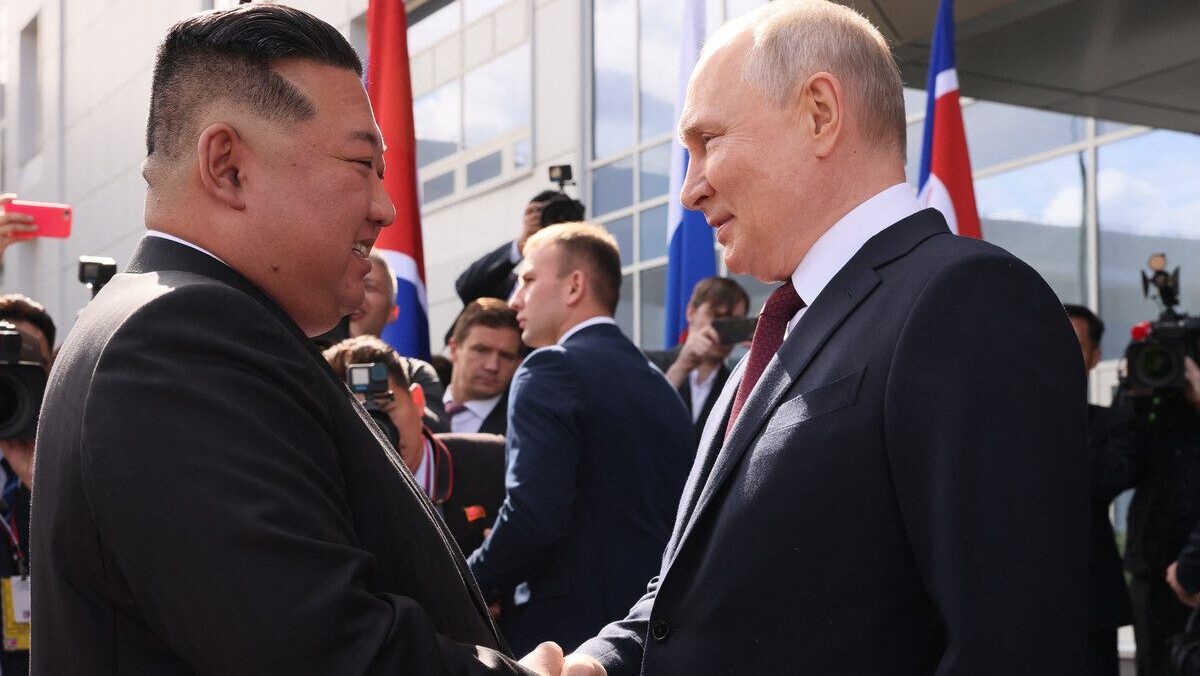
Russia’s President Vladimir Putin shakes hands with North Korea’s leader Kim Jong Un during their meeting at the Vostochny Cosmodrome in the Amur region on September 13th, 2023.
Photo: MIKHAIL METZEL / POOL / AFP
On September 13th, North Korean leader Kim Jong-un and Russian President Vladimir Putin met on Russian soil in what is the former’s first foreign visit since 2019, international media report.
Following similar overtures made towards Iran and Cuba, Putin’s inviting of Kim marks the latest in Russia’s broader strategy—drawing closer to other nations heavily sanctioned by the West and its partners and allies.
For 40 seconds, the two leaders shook hands at the Vostochny Cosmodrome, Russia’s most advanced space rocket launch site in its Far East. Initially, it was suspected that their summit would take place at the Eastern Economic Forum in Vladivostok.
Kim Jong Un and Vladimir Putin had a lengthy handshake as the North Korean leader arrived for a meeting in Russia where they are expected to discuss an arms deal ⤵️ pic.twitter.com/tsV216PWGX
— Al Jazeera English (@AJEnglish) September 13, 2023
As Kim put it during a later banquet toast, both nations appear to have found each other in a “sacred fight” for “the punishment of a great evil that claims hegemony and feeds an expansionist illusion,” i.e. the West.
At the launch site, the North Korean supreme leader asked detailed rocket-related questions as the Russian president showed him around.
The location of their meeting was not haphazard, as the North Korean leader has set his mind on obtaining Russian expertise on space satellites, as evinced by the composition of his entourage, which included several senior North Korean officials involved in the satellite program, such as chairman of the North Korean Space and Technology Committee, Pak Thae-song.
Earlier this year, North Korea made two unsuccessful attempts to launch its first military spy satellite, which Kim in 2021 named North Korea’s defense program’s priority. A third launch is scheduled for October.
At the end of their talks, which TASS says lasted five hours, Putin told journalists that Russia is going to help North Korea launch satellites. “That’s why we came here,” he said.
In addition to helping North Korea develop its satellite program, it is possible that Russia will provide food aid to the famine-stricken North Korea.
Western analysts are however more concerned that Russia might be turning to North Korea to beef up its ammunition supplies for the war in Ukraine. Since North Korea possesses large quantities of munitions, all made to Soviet specifications, these would be well suited for use by the Russian military.
The presence of Munitions Industry Department Director Jo Chun Ryong at the summit indicates that cooperation in this area would have been on the agenda, analysts say.
As Russia, a permanent member of the United Nations Security Council, officially supports UN sanctions against North Korea, such arms deliveries and boosting North Korea’s missile program would constitute a violation of these sanctions.
When asked about the matter, Putin said that while there is the prospect of so-called “military-technical cooperation” between the two nations, Russia would abide by them.
As it had done before Kim’s visit, Washington threatened further sanctions over any weapons transfers by either country to the other.
“We have taken a number of actions already to sanction entities that brokered arms sales between North Korea and Russia, and we won’t hesitate to impose additional sanctions if appropriate,” U.S. State Department spokesman Matthew Miller said at a press briefing, calling it “troubling” that Russia would discuss cooperation with North Korea on programs that would potentially violate U.N. Security Council resolutions.
As reported by Reuters, U.N. Secretary-General Antonio Guterres told reporters that “any form of cooperation of any country with North Korea must respect the sanctions regime that was imposed by the Security Council,” adding that it was “extremely relevant” in the case of Russia and North Korea.
At the end of his meeting with Putin, Kim said North Korea would “always support the decisions of President Putin” and that they would “be together in the fight against imperialism.”
It is unclear how long Kim will remain in Russia. According to Russian media, Kim Kim has already traveled to Komsomolsk-on-Amur, where he will visit a factory for aircraft parts. His next port of call would be Vladivostok, where Russia’s Pacific Fleet is docked.
